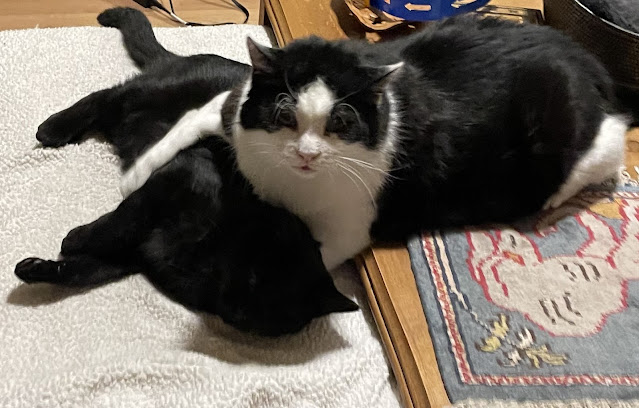Caturday: Cats and Cancer
This is not the first time we have written about cat cancer in a Caturday post. We learn more about it over time, and it seems that more in general is learned about it over time.
Blind Cat rescued share the following interesting and information post about cat cancer: Feline Carcinoma (blindcatrescue.blogspot.com). Cat cancer not only occurs, but at least in our household has become common as our cats have aged. Among our cats, three have died of it, and two are living with it. The breed does not seem to matter; it appears that cancer is blind to breed.
Intrepid was the first to be diagnosed with cancer and the first to die with it. In his cancer, it was small cell lymphoma. He lived only a few months after diagnosis. His vet missed the cancer -- that happens with people, too. After describing Intrepid's late night howling to a friend who works at the SPCA, he gave us the name of a vet with excellent diagnostic skills. She immediately intuited the problem, scoped Intrepid, found the cancer, and put him on chemotherapy. The chemotherapy threw him for a loop (after all, it is posion), and he ended up not being able to cope with either the cancer or its treatment. Intrepid was a Mau/Tabby mix.
Murjan was the second cat to be diagnosed with cancer and the second to die with it. He was diagnosed right after Intrepid. The vet that time suggested that we take him to Intrepid's specialist. Lo and behold, he had small cell lymphona, too. We wondered if there were any connection between the two since both had come with us from Jordan (we lived and worked there for a few years). The short answer? No. Murjan lived almost four years on daily chemotherapy and died at nearly 19 years old. He came from a very hardy stock; perhaps that is why he outlived (and very much missed) Intrepid, his inseparable-until-death pal. Murjan was a Turkish van.
Sula, not our cat but our friend, served as the fur ambassador at Old Mission San Juan Bautista. She was the third cat in our "circle" to die of cancer. She had cancer nearly all of her 17-year life: skin cancer, injection site carcinoma, and the cancer that killed her, leg tumors. Like Murjan, she was hardy. She has a book about her cancer: Surviving Cancer, Healing People: One Cat's Story. Sula was a Turkish van.
Happy Cat was our third cancer to be diagnosed with cancer. And he has lived! Twice he has had the cancer removed from his face through freezing. (In our opinion, this is better than cutting though many vets do cut -- I am assuming because they do not have the tools to freeze the cancer off). We keep Happy Cat away from the sun, and he seems as happy to be lounging on one of our favorite chairs as he did in lying in a bean bag in the sun. Happy Cat is a tuxedo cat, domestic shorthair as a breed.
Snyezhka was our fourth cat to be diagnosed with cancer. I felt a lump under her belly skin. The vet said it was nothing to be concerned about. Three months later, she had another lump. That time the vet said it was stage 4 breast cancer and untreatable. She gave her four months of living yet to do, on the outside. We took her to Sula's oncologist who said there was hope and put her on immunotherapy. She went into clinical remission in a year and remained in remission for two more years, during which the oncologist did period check-ups. Then, cancer reappeared, this time in her lungs and liver. Although it is rare for cancer to be in remission for years and then spread, the vet said that this is what happened. Oddly, Snyezhjka died from a saddle thrombus. She was a Siamese Mix (probably with Tabby).
Simone is the latest to have been diagnosed with cancer. Perhaps diagnosed is the wrong word. She had a cyst. It burst several times, going away for a few hours and then reappearing rather quickly. It finally became infected. Antibiotics did not work. The vet did not want to do surgery because Simone is almost 17 years old. We pushed for the surgery; the vet found carcinoma. Thank goodness, we did the surgery. The vet got all of the cancer out, and Simone is doing fine -- and is two years older than the typical upper age for her breed (10-15 is the typical life span for her breed). She is Himalayan.
Bottom line: cancer sucks. No breed has an exclusive on cancer; it attacks indiscriminately. Catching it early, as with people, can help. When a cat behaves in mysterious ways or has lumps or sores, I would watch to check out the possibility of cancer, whether or not the vet initially suggests it. Just saying...
For more Caturday posts, click HERE.
Sign up for the MSI Press LLC newsletter
Follow MSI Press on X, Face Book, and Instagram.
in exchange for reviewing a current or forthcoming MSI Press LLC book?
Contact editor@msipress.com.
Want an author-signed copy of this book?
Purchase the book at 25% discount (use coupon code FF25)
and concurrently send a written request to orders@msipress.com.
You can!
Find their contact information on our Authors' Pages.




Comments
Post a Comment